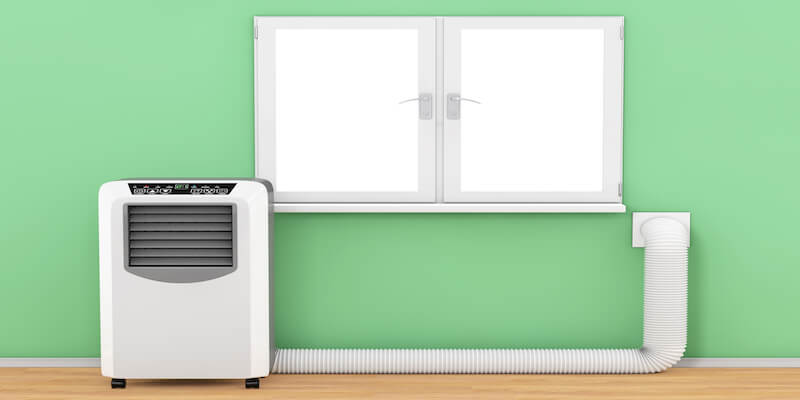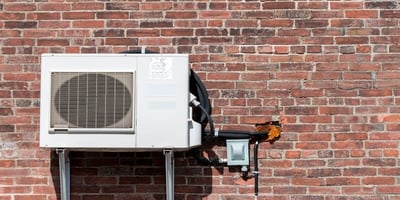Do Portable Air Conditioners Work? Benefits, How to Choose, Factors to Consider
Key Takeaways
- Portable air conditioners deliver effective cooling for small to medium-sized rooms, but their performance depends heavily on proper sizing, placement, and usage. They work best as targeted cooling solutions rather than whole-home alternatives.
- Choosing the right BTU rating prevents both undercooling and energy waste. Match cooling capacity to your room size while accounting for factors like sun exposure, ceiling height, and heat-generating electronics. Oversized units cycle too quickly and leave spaces humid despite cool temperatures.
- Smart usage habits impact performance as much as the unit itself. Pre-cooling before afternoon heat, sealing gaps around exhaust vents, and maintaining clean filters can improve efficiency by 20-40%. Automation through scheduling and geofencing eliminates energy waste from forgotten operation.
- Dual-hose systems and Energy Star certification justify their higher upfront costs through 30-40% better efficiency and $20-40 annual energy savings. Total ownership cost matters more than purchase price when units run for extended summer periods.
- Adding smart control capabilities transforms any portable AC into an intelligent climate system, enabling app control, automated scheduling, and energy monitoring regardless of which model you own—often delivering better value than factory-integrated WiFi at lower overall cost.
You're sweating through another summer night, central AC isn't an option, and window units won't fit. So you're wondering: do portable air conditioners work? Yes—but with important caveats. These self-contained units deliver real cooling for rooms up to 500 square feet, though performance depends entirely on proper sizing, smart placement, and realistic expectations. Here's what you need to know before buying.
How Portable Air Conditioners Work
Unlike traditional window air conditioners, portable air conditioners do not require any installation or permanent alteration to your home. They are self-contained units that can be easily moved from room to room and plugged into any standard outlet.
The way they work is similar to other air conditioners: they use refrigerant to absorb heat from the air inside your home, and then release that heat outside. The cooled air is then circulated back into the room through a fan.
One thing to note is that portable air conditioners do require access to an exhaust hose, which is used to vent the hot air outside. This hose can be placed in a window or through a hole in a wall, depending on the specific model. Some portable air conditioners also have a built-in dehumidifier, which helps to remove excess moisture from the air and can improve overall indoor air quality.
Benefits of Portable Air Conditioners
There are several benefits to using a portable air conditioner, including:
- Flexibility: As mentioned, portable air conditioners can be easily moved from room to room, making them a great option for homes or offices where central air conditioning is not an option. They can also be taken with you when you travel, so you can have cool air wherever you go.
- Cost-effectiveness: Portable air conditioners are generally more affordable than installing a central air conditioning system, especially if you only need to cool one or two rooms. They are also a good choice for renters who are not able to make permanent modifications to their living space.
- Energy efficiency: Many modern portable air conditioners are energy efficient, with Energy Star ratings and other certifications that can help you save on your energy bills. Look for models with high energy efficiency ratios (EER) and lower power consumption.
- Quiet operation: Portable air conditioners are generally quieter than window units, making them a good choice for bedrooms or other areas where noise may be an issue.
Drawbacks of Portable Air Conditioners
While portable air conditioners can be a convenient and cost-effective option for cooling small to medium-sized rooms, there are also some drawbacks to consider:
- Limited cooling capacity: Portable air conditioners are not as powerful as central air conditioning systems, and may not be able to effectively cool larger rooms or homes. It's important to choose a model with the appropriate BTUs (British Thermal Units) for the size of your space.
- Venting requirements: As mentioned, portable air conditioners require access to an exhaust hose to vent hot air outside. This can be inconvenient if you don't have a suitable window or wall to attach the hose to. Some models may also require regular maintenance to keep the exhaust hose clear and functioning properly.
- Higher energy usage: While some portable air conditioners are energy efficient, they can still use more energy than a window unit or ceiling fan. This is especially true if you need to run the unit for long periods of time or if you are cooling a large space.
 Factors to Consider When Choosing a Portable Air Conditioner
Factors to Consider When Choosing a Portable Air Conditioner
The wrong portable AC leaves you sweating through summer or wasting money on an oversized system that cycles constantly without removing humidity. Understanding these key factors ensures you invest in a unit that delivers comfortable, energy-efficient cooling for your specific situation.
Cooling Capacity and BTU Rating
British Thermal Units (BTUs) measure how much heat an air conditioner removes per hour. Higher ratings mean more cooling power, but bigger isn't always better. An undersized unit runs constantly, driving up bills. An oversized unit cools too quickly without removing moisture, leaving your space muggy.
For standard 8-foot ceilings:
- 150-250 sq ft: 8,000 BTUs
- 250-350 sq ft: 10,000 BTUs
- 350-450 sq ft: 12,000 BTUs
- 450-550 sq ft: 14,000 BTUs
Adjust upward 10-20% for high ceilings, heavy sun exposure, multiple occupants, heat-generating electronics, or poor insulation. Also note that newer DOE ratings measure actual cooling output more accurately than older ASHRAE ratings—a unit showing 12,000 ASHRAE BTUs might list only 8,000 DOE BTUs for the same performance.
Single-Hose vs. Dual-Hose Systems
Single-hose units exhaust indoor air outside, creating negative pressure that pulls hot outdoor air through gaps around doors and windows. Your AC then fights this constant warm air infiltration.
Dual-hose systems use separate intake and exhaust hoses, maintaining neutral pressure and improving efficiency by 30-40%. They cost more upfront but deliver faster cooling and lower energy consumption. Worth the investment for regular use.
Energy Efficiency and Operating Costs
Energy Efficiency Ratio (EER) measures cooling output per watt consumed. EER of 10+ indicates solid efficiency. Energy Star certified models use 15-25% less energy than standard units.
Running a 12,000 BTU portable AC 8 hours daily at $0.15/kWh costs $135-180 over a 90-day summer. Energy Star certification saves $20-40 per season.
Smart usage matters as much as the unit itself. Programmable timers, thermostatic controls, and eco-modes optimize efficiency. Adding a smart controller enables geofencing, automated schedules, and real-time energy monitoring that identifies waste patterns.
Noise Levels
Most residential portable ACs run 50-60 dB. For context: 50 dB equals quiet conversation, 60 dB matches office noise. Above 60 dB disrupts sleep and focused work.
For bedrooms or home offices, prioritize models with sleep modes or specified decibel ratings at different fan speeds. User reviews reveal real-world noise better than specifications—especially compressor cycling sounds that prove more disruptive than steady fan noise.
Condensate Drainage
Portable ACs handle moisture through three approaches:
Self-evaporating systems recycle condensation into exhaust air, eliminating manual drainage under most conditions. Best for moderate humidity.
Gravity-drain systems collect water in reservoirs requiring periodic emptying or continuous hose drainage. Safety shutoffs interrupt cooling when full.
Condensate pumps actively expel water but add mechanical complexity.
Self-evaporating models offer the best convenience-reliability balance for most homeowners.
Portability
Units range from 50-80+ pounds. If moving between rooms regularly, weight matters significantly. Check for caster wheels with locks and well-positioned handles.
Every portable AC requires window venting. Moving rooms means reconfiguring exhaust setup unless you buy additional window kits. Hose lengths (4-7 feet) limit positioning distance from windows.
Smart Features and Connectivity
WiFi-enabled units offer app control, voice commands through Alexa or Google Assistant, and automated scheduling. You can pre-cool before arriving home or shut off remotely.
Many quality portable ACs lack built-in smart capabilities, but that doesn't mean settling for manual operation. Smart AC controllers like Sensibo retrofit intelligence onto any portable unit with an infrared remote—enabling app control, voice commands, geofencing, Climate React automation, and energy monitoring. Often delivers better value than factory-integrated WiFi at lower cost.
Additional Features
Dehumidifier modes extract moisture without cooling—useful in humid shoulder seasons. Fan-only modes circulate air when cooling isn't needed. Air filtration varies from basic dust capture to HEPA filters for allergen control.
Remote controls and timer functions add convenience, especially for bedroom units. Sleep modes gradually adjust temperature overnight.
Installation and Power
Most units plug into standard 120V/15A outlets but draw 10-15 amps while running. Avoid sharing circuits with other high-draw appliances. Skip extension cords—they overheat with sustained high amperage.
Verify your window type accommodates the venting kit. Casement windows or sliding doors may need specific adapters.
Maintenance
Filter cleaning every 2-4 weeks prevents airflow restriction. Check condensate reservoirs during humid periods. Clean drain pans annually to prevent mold. Inspect exhaust hoses for kinks.
Before seasonal storage, run fan-only mode for several hours to dry internal components. Store upright in dry locations.
Budget Considerations
Prices range from $250 (basic 8,000 BTU) to $800+ (premium high-capacity). Mid-range options ($400-600) typically balance performance, features, and durability best.
Consider total ownership cost: cheaper, less efficient units cost more through higher electricity bills over their lifespan. A quality mid-range portable AC paired with a smart controller often outperforms expensive factory-integrated WiFi models while costing less overall.
 How to Maximise Your Portable Air Conditioner's Performance
How to Maximise Your Portable Air Conditioner's Performance
Even the best portable AC underperforms when used incorrectly. These practical adjustments ensure your unit operates at peak efficiency while keeping energy costs down.
Optimise Placement and Ventilation
Position your portable AC near the center of the room rather than tucked in a corner. This allows cooled air to circulate evenly throughout the space. Keep the unit at least 12-18 inches from walls and furniture to prevent airflow obstruction.
Straighten the exhaust hose as much as possible—every bend restricts airflow and forces the compressor to work harder. The shorter and straighter the hose path, the better your cooling efficiency. If possible, insulate the hose with foam wrap to prevent heat radiating back into your room.
Seal gaps around your window kit with weatherstripping or foam tape. Even small openings let hot air infiltrate and cooled air escape, undermining your unit's efforts.
Reduce Heat Load Before Cooling
Close blinds and curtains on sun-facing windows during peak afternoon hours. Direct sunlight streaming into a room can add thousands of BTUs of heat that your portable AC must overcome. Blackout curtains make a noticeable difference in cooling speed and energy consumption.
Turn off unnecessary heat sources: incandescent lights, unused electronics, and appliances generate surprising ambient heat. Switch to LED bulbs and power down devices not in use.
Pre-cool during cooler morning hours rather than waiting until afternoon heat peaks. Getting ahead of temperature rise requires less energy than fighting established heat.
Use Smart Temperature Strategies
Set your thermostat to 24-26°C (75-78°F) rather than cranking it to maximum cold. Every degree cooler increases energy consumption by 3-5%. Your body acclimates quickly to moderate cooling, and the humidity reduction often matters more than raw temperature.
Combine your portable AC with ceiling fans or oscillating fans. Moving air feels 3-4 degrees cooler than still air at the same temperature, allowing you to set your AC higher while maintaining comfort. The fan uses a fraction of the AC's electricity.
Avoid constant temperature adjustments. Find a comfortable setpoint and let the unit maintain it. Frequent changes force the compressor to cycle more often, reducing efficiency and accelerating wear.
Leverage Automation and Scheduling
Program your portable AC to start cooling 15-20 minutes before you arrive home rather than running all day in an empty room. This simple scheduling adjustment can cut energy consumption by 30-40% while ensuring comfort when you walk through the door.
Use geofencing features—available through smart AC controllers—to automatically activate cooling as you approach home and shut down when you leave. This eliminates forgotten AC sessions that waste energy for hours.
Set nighttime schedules that gradually raise temperature as outdoor air cools. Your body temperature naturally drops during sleep, requiring less aggressive cooling. A 2-3 degree increase overnight saves energy without disrupting rest.
Climate React features maintain temperature within a tight range by anticipating heating and cooling needs rather than reacting after the room drifts outside your comfort zone. This proactive approach reduces compressor cycling and energy waste.
Maintain Peak Operating Condition
Clean filters every two weeks during heavy use. Clogged filters restrict airflow dramatically, forcing your unit to work 15-20% harder for the same cooling output. Most filters rinse clean under running water and dry within an hour.
Check the condensate system regularly. Full reservoirs trigger automatic shutoffs that interrupt cooling. Self-evaporating systems still need occasional drainage during high-humidity periods.
Inspect the exhaust hose monthly for kinks, cracks, or loose connections. Damaged hoses leak hot air back into your room and reduce cooling capacity significantly.
Keep the condenser coils clean. Dust accumulation acts as insulation, preventing efficient heat transfer. Gently vacuum accessible coils at the start of each cooling season.
Monitor and Adjust Based on Results
Track your energy usage through smart controllers or utility monitoring to identify waste patterns. You might discover the unit runs longer than necessary or operates during unoccupied hours.
Pay attention to humidity levels alongside temperature. Portable ACs should reduce indoor humidity to 40-50%. If your space feels clammy despite cool temperatures, your unit may be oversized and cycling too quickly to dehumidify properly.
Adjust strategies seasonally. Early summer requires different approaches than peak heat. Shoulder seasons might need dehumidifier-only mode rather than full cooling.
Choosing the Right Cooling Solution
So, do portable air conditioners work? As we've seen, they can be an effective and convenient option for cooling small to medium-sized rooms. However, they may not be the best choice for larger homes or for those looking for the most energy-efficient option.
Before deciding on a cooling solution, it's important to consider your specific needs and budget. A climate technology company can help you assess your options and choose the best solution for your home or office. Here are a few factors to consider:
- Size of your space: As mentioned, portable air conditioners are best suited for small to medium-sized rooms. If you need to cool a larger area or your entire home, a central air conditioning system may be a better option.
- Energy efficiency: If energy efficiency is a top priority, look for portable air conditioners with Energy Star ratings and high EERs. You may also want to consider alternative cooling options, such as a ceiling fan or window unit, which use less energy.
- Venting requirements: Consider whether you have a suitable window or wall for an exhaust hose, or if you are willing to make modifications to accommodate the hose.
- Budget: Determine how much you are willing to spend on a cooling solution and consider the long-term costs of operation and maintenance.
Essentially, portable air conditioners can be a convenient and effective way to cool small to medium-sized rooms. While they do have some limitations and drawbacks, they can be a cost-effective and flexible solution for those without central air conditioning or who only need to cool certain areas of their home. If you are considering a portable air conditioner, be sure to choose the right size and model for your space.
FAQ
How much electricity does a portable air conditioner use?
Most units consume 1,000-1,500 watts per hour, costing $0.12-0.23 hourly at average rates. Running a 12,000 BTU unit 8 hours daily costs roughly $30-60 monthly. Higher EER ratings and smart scheduling can cut consumption by 25-40%.
Can a portable AC cool multiple rooms?
They're designed for single-room use. You can cool adjacent spaces by leaving doors open and using fans, but efficiency drops significantly. For separate rooms or whole-house cooling, you'll need multiple units or central HVAC.
Why is my portable AC running but not cooling?
Check the basics first: ensure it's set to 'Cool' mode (not 'Fan'), thermostat is below room temperature, filters are clean, and the exhaust hose isn't kinked. Also verify the condensate tank isn't full. If everything checks out, the unit may be undersized for your space or fighting excessive heat load from sun exposure.
Do I need to drain water from my portable AC?
Most modern units self-evaporate condensate through the exhaust hose. In moderate humidity, you may never need to drain manually. In high humidity (70%+), you'll need to empty the reservoir more frequently—sometimes weekly or even daily.
How loud are portable air conditioners?
Typically 50-60 dB, comparable to normal conversation. Many people sleep fine with them running, though compressor cycling can be disruptive for light sleepers. Look for sleep modes and units rated below 52 dB for bedrooms.
Single-hose vs. dual-hose: what's the difference?
Single-hose units create negative pressure that pulls hot air into your room, reducing efficiency. Dual-hose systems maintain neutral pressure and work 30-40% more efficiently. Worth the extra $100-200 for regular use.
How do I make my portable AC work better?
Clean filters every 2-3 weeks, straighten and shorten the exhaust hose, seal gaps around window kits, close blinds, and eliminate heat sources. Adding a smart controller enables automated scheduling and geofencing that optimizes performance while cutting energy waste.




































.jpg?height=200&name=photo_2025-02-07_20-01-26%20(1).jpg)

